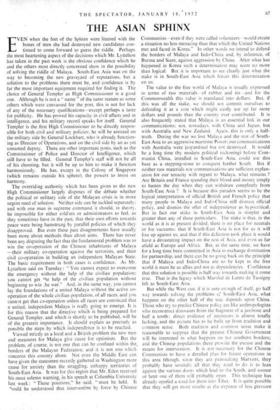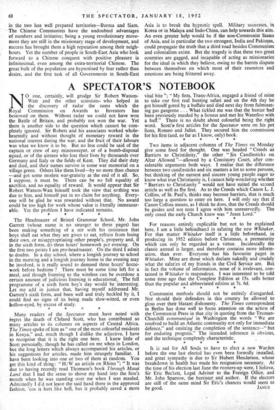THE ASIAN SPHINX
EVEN when the feet of the Sphinx were littered with the bones of men she had. destroyed new candidates con- tinued to come forward to guess the riddle. Perhaps the most heartening aspect of the decisions which Mr. Lyttelton has taken in the past week is the obvious confidence which he and the others most directly concerned show in the possibility of solving the riddle of Malaya. South-East Asia was on the way to becoming the new graveyard of reputations, but a solution to the problems there must be, and confidence is by far the most important equipment required for finding it. The choice of General Templer as High Commissioner is a good one. Although he is not a " name " of the same stature as some others which were canvassed for the post, this is not for lack of any of the necessary qualifications—except perhaps a taste for publicity. He has proved his capacity in civil affairs and in intelligence, and his military record speaks for itself. General Templer is the first High Commissioner to be directly respon- sible for both civil and military policies; he will be assisted on the military side by General Lockhart, who is already function- ing as Director of Operations, and on the civil side by an as yet unnamed deputy. There are other important posts, such as the Commissioner of Police and Director of Intelligence, which still have to be filled. General Templer's staff will not be all of his choosing, but it will be up to him to make it function harmoniously. He has, except in the Colony of Singapore (which remains outside his sphere), the powers to insist on harmony.
The overriding authority which has been given to the new High Commissioner largely disposes of the debate whether the political or military side of the Malayan crisis is in more urgent need of solution. Neither side can be tackled separately: and with one man in supreme comn)and it should, in theory, be impossible for either soldiers or administrators to feel, as they sometimes have in the past, that their own efforts towards peace were being hamstrung by parallel policies of which they disapproved. But even these past disagreements have usually been more about methods than about aims. There has never been any disputing the fact that the fundamental problem was to win the co-operation of the Chinese inhabitants of Malaya —their military co-operation against the terrorists, and their civil co-operation in building an independent Malayan State. The basic requirement in both cases is confidence. As Mr. Lyttelton said on Tuesday : " You cannot expect to overcome the emergency without the help of the civilian population; you cannot get he help of the civilian population without beginning to win .he war." And, in the same way, you cannot lay the foundations of a united Malaya without the active co- operation of the whole civilian population, of all races, and you cannot get that co-operation unless all races are convinced that a united, independent Malaya is really going to emerge. It is for this reason that the directive which is being prepared for General Templer, and which is shortly to be published, will be of the greatest importance. It should explain as precisely as possible the steps by which independence is to be reached. Viewed strictly as a local and a British problem the new men and measures for Malaya give cause for optimism. But the problem, of course, is not one that can be confined within the. borders of the Malayan Federation, and it is not one- which concerns this country alone. Not even the Middle East can have given the statesmen recently gathered in Washington more cause for 'anxiety than the straggling, unhappy territories of South-East Asia. It was for this region that Mr. Eden reserved his most solemn warning, in his speech at Columbia University last week : " These positions," he .said, " must be held. It 'hould be understood that intervention by force by Chinese Communists—even if they were called volunteers—would create a situation no less menacing than that which the United Nations met and faced in Korea." In other words we intend to defend the borders of Malaya and Indo-China and, by inference, of Burma and Siam, against aggression by China. After what has happened in Korea such a determination may seem no more than logical. But it is important to see clearly just what the stake is in South-East Asia which forces this determination on us.
The value to the tree world of Malaya is usually expressed in terms of raw materials--of rubber and tin—and for the Commonwealth this value is translated into dollars. But, if this was all the stake, we should not commit ourselves to defending it at a cost which might easily use up far more dollars and pounds than the country ever contributed: It is also frequently stated that Malaya is an essential link in our communications; not, nowadays, with China and Japan, but with Australia and New Zealand. Again, this is only a half- truth. During the war we lost Malaya and the rest of South- East Asia to an aggressive maritime Power; our communications with Australia were jeopardised but not destroyed. It would be .a long time (by modern political reckoning) before Com- munist China, installed in South-East Asia, could use this base as a stepping-stone to conquest further South. But if neither raw materials nor communications are sufficient explan- ation for our tenacity with regard to Malaya, what remains ? Are Britain and France spending their blood and money simply to hasten the day when they can withdraw completely from South-East Asia ? It is because this paradox seems to be the logical ,interpretation of official British and French policy that many people in Malaya and, Indo-China still distrust official policy, and dismiss the offer of independence as hypocritical. But in fact our stake in South-East Asia is simpler and greater than any of these particulars. The stake is that, in the world as it is at present divided, there is no place for neutrals 'or for vacuums; that if South-East Asia is not for us it will line up against us, and that if this defection took place it would have a devastating impact on the rest of Asia, and even as far afield as Europe and Africa. But. at the same time, we have for a long time been committed in Asia to exchange domination for partnership, and there can be no going back on the principle that if Malaya and Indo-China are to be kept in the free world it must be as allies and not as dependencies. Confidence that this solution is possible is half way towards making it come true. That is the legacy which Marshal de Lattre de Tassigny left to South-East Asia.
But while the West can, if it is sure enough of itself, go half way towards solving the problems c; South-East Asia, what happens on the other half of the way depends upon China. Those who try to predict Chinese policy are like anthropologists who reconstruct dinosaurs from the fragment of a jawbone and half a tooth : direct evidence of intentions is almost totally lacking, and the picture has to be built up from tradition and common sense. Both tradition and common sense make it reasonable to suppose that the present Chinese Government will be interested in what happens on her southern borders; and the Chines, populations there provide the excuse and the means for intervention. It is not 'necessary for the Chinese Communists to have a detailed plan for future operations in this area (though, since they are painstaking Marxists, they probably have several); all that they need to do is to lean against the various doors which lead to the South, and sooner or later one of them will probably open. This technique has already opetled a road for them into Tibet. It is quite possible that they will get more results at the expense of less pressure in the two less well prepared territories—Burma and Siam. The Chinese Communists have the undoubted advantages of numbers and initiative; being a young revolutionary move- ment they are still in the missionary stage of development, and success has brought them a high reputation among their neigh- bours. Yet the number of people in South-East Asia who look forward to a Chinese conquest with positive pleasure is infinitesimal, even among the extra-territorial Chinese. The great bulk of the population are hypnotised by fear rather than desire, and the first task of all Governments in _ South-East Asia is to break the hypnotic spell. Military successes, in Korea or in Malaya and Indo-China, can help towards this aim. An even greater help would be if the non-Communist States of Asia, and in particular the two strongest, India and Pakistan, could propagate the truth- that a third road besides Communism and colonialism exists. But the tragedy is that these two great countries are gagged, and incapable of acting as missionaries for the ideal in which they believe, owing to the barren dispute between themselves on which most of their resources and emotions are being frittered away.



































 Previous page
Previous page